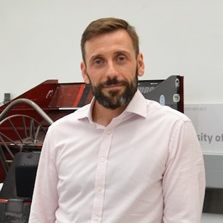Enhancing Tribology Processes for Sustainable Engineering Industries
A special issue of Processes (ISSN 2227-9717). This special issue belongs to the section "Sustainable Processes".
Deadline for manuscript submissions: closed (19 March 2024) | Viewed by 264
Special Issue Editors
Interests: tribological methods and techniques for enhancing efficiency; design methodologies for mechanical components and devices; acoustic emissions for tribological diagnosis; application of machine learning, AI, and neural networks in tribological systems; energy and materials in manufacturing and transportation; biomedical engineering devices and applications; water systems and resource management
Special Issues, Collections and Topics in MDPI journals
Interests: environmental pollutants and indoor air quality; additive manufacturing – 3D printing; tribology (application in transportation and textile/3D printing industry); textile processing and recycling; waste to energy/bio-product technologies; clean energy and low/zero-carbon fuels; advanced propulsion systems; energy recovery and thermal management; emission control technologies and catalytic convertors
Interests: textiles; textile chemistry, textile processing, technical textiles, dyeing and printing of textiles, chemical textile analysis - additive manufacturing; providing antifouling properties to fishing nets, antibacterial textiles, insect repellent textiles - biomaterials, microencapsulation technologies, characterization of chemicals, layer-by-layer depos
Interests: mechanical design, tribology, failures in polymer gear: wear, surface, crack propagation and fracture, industrial mechanical design: machine design, product design and development and environment; wastewater treatment; biological design; synergistic solutions; bioremediation
Special Issue Information
Dear Colleagues,
The Special Issue "Sustainable Tribology: Enhancing Processes for Environmental Efficiency" in Processes aims to explore the intersection of tribology and sustainability, focusing on enhancing processes for improved environmental efficiency. Tribology, the science and engineering of interacting surfaces in relative motion, is crucial in various industries and applications, including additive manufacturing, textile processing, transportation and energy sectors. By understanding and optimising surface interactions, tribology can contribute significantly to achieving sustainable development goals by reducing energy consumption, minimising wear and friction, and improving overall system performance. This special issue seeks to bring together researchers, scientists, and engineers to share their latest findings, methodologies, and innovations in sustainable tribology. It highlights the vital role of tribology in increasing efficiency and reducing component failures within large-scale production runs, leading to financial savings, increased production, reduced energy costs for manufacturers, and increased customer satisfaction. Additionally, it emphasises the importance of tribology in sectors such as transportation, additive manufacturing, and the textile industry, identifying challenges related to waste management, recycling, and air quality impact.
We invite contributions from researchers in tribology and related disciplines to submit their original research papers, reviews, or case studies to this special issue. Topics of interest include but are not limited to novel lubricants and additives for improved energy efficiency, surface engineering techniques for reduced friction and wear, tribocorrosion and its impact on sustainability, eco-friendly materials and coatings for tribological applications, modelling and simulation approaches for sustainable tribology, and innovative strategies for waste reduction and recycling in tribological systems. We particularly encourage submissions highlighting practical applications and case studies demonstrating the successful implementation of sustainable tribology principles in real-world scenarios. By bringing together diverse perspectives and cutting-edge research, this special issue aims to advance the field of sustainable tribology and provide valuable insights into enhancing processes for environmental efficiency.
Prof. Dr. Karl David Dearn
Dr. Omid Doustdar
Dr. Gülşah Ekin Kartal
Dr. Iestyn Stead
Guest Editors
Manuscript Submission Information
Manuscripts should be submitted online at www.mdpi.com by registering and logging in to this website. Once you are registered, click here to go to the submission form. Manuscripts can be submitted until the deadline. All submissions that pass pre-check are peer-reviewed. Accepted papers will be published continuously in the journal (as soon as accepted) and will be listed together on the special issue website. Research articles, review articles as well as short communications are invited. For planned papers, a title and short abstract (about 100 words) can be sent to the Editorial Office for announcement on this website.
Submitted manuscripts should not have been published previously, nor be under consideration for publication elsewhere (except conference proceedings papers). All manuscripts are thoroughly refereed through a single-blind peer-review process. A guide for authors and other relevant information for submission of manuscripts is available on the Instructions for Authors page. Processes is an international peer-reviewed open access monthly journal published by MDPI.
Please visit the Instructions for Authors page before submitting a manuscript. The Article Processing Charge (APC) for publication in this open access journal is 2400 CHF (Swiss Francs). Submitted papers should be well formatted and use good English. Authors may use MDPI's English editing service prior to publication or during author revisions.
Keywords
- air pollution
- water pollution
- manufacturing
- textile
- additive manufacturing
- 3D printing
- tribology
- lubrication
- recycling
- waste to bio-product








